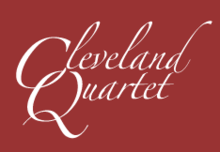Cleveland Quartet: Difference between revisions
Content deleted Content added
No edit summary |
EurekaLott (talk | contribs) Undid revision 467437577 by Jussireijonen (talk) text copied from http://www.clevelandquartet.com/html/history.html |
||
| Line 13: | Line 13: | ||
| past_members = [[Donald Weilerstein]], Violin (1969–1988)<br> [[Martha Strongin Katz]], Viola (1969–1980)<br>[[Atar Arad]], Viola (1980–1987) |
| past_members = [[Donald Weilerstein]], Violin (1969–1988)<br> [[Martha Strongin Katz]], Viola (1969–1980)<br>[[Atar Arad]], Viola (1980–1987) |
||
}} |
}} |
||
The '''Cleveland Quartet''' was one of the world's leading [[string quartet]]s for over two decades. It was founded in 1969 by [[violin]]ists [[Donald Weilerstein]] and [[Peter Salaff]], cellist [[Paul Katz]] and violist [[Martha Strongin Katz]], at the [[Cleveland Institute of Music]]. The quartet subsequently disbanded in 1995 after twenty-six years of performance. As of 2007 Paul Katz, Martha Strongin Katz and Donald Weilerstein are on the faculty of the New England Conservatory of Music; Peter Salaff is on the faculty of the Cleveland Institute of Music. |
The '''Cleveland Quartet''' was one of the world's leading [[string quartet]]s for over two decades. It was founded in 1969 by [[violin]]ists [[Donald Weilerstein]] and [[Peter Salaff]], cellist [[Paul Katz]] and violist [[Martha Strongin Katz]], at the [[Cleveland Institute of Music]]. The quartet subsequently disbanded in 1995 after twenty-six years of performance. As of 2007 Paul Katz, Martha Strongin Katz and Donald Weilerstein are on the faculty of the New England Conservatory of Music; Peter Salaff is on the faculty of the Cleveland Institute of Music. |
||
<br /> |
|||
For more than a quarter of a century, the '''Cleveland Quartet''' was hailed as one of the premier string quartets of our time. Since their inception in 1969, they played more than 2,500 concerts (including appearances in music capitals throughout the world), created award-winning recordings of more than 60 chamber works, presented premiers and repeat performances of new music by contemporary composers, and spent countless hours as dedicated conservatory teacher-performers (initially at the Cleveland Institute of Music, then at the State University of New York at Buffalo, and finally at the Eastman School of Music in Rochester). <br /> |
|||
<br /> |
|||
During 26 years of intensive music-making as one of the most admired ensembles on the international scene, the Cleveland Quartet performed nearly 30 complete Beethoven quartet cycles in cities such as New York, Washington D.C., San Francisco, Paris, Rome, London, Florence, and Tokyo. They had undertaken a regular series of recital tours throughout the United States, Canada, Europe, and Japan, and had also performed in the former Soviet Union, South America, Australia, New Zealand, the Middle East, and Eastern Asia. Other highlights included repeated appearances at such prestigious music festivals as Salzburg, Edinburgh, Lucerne, Berlin, and Helsinki, as well as annual appearances at New York's Mostly Mozart Festival and 20 years of summer residencies at the Aspen Festival in Colorado. In addition, they made numerous radio and television appearances, and performed in a Presidential Inaugural Concert.<br /> |
|||
<br /> |
|||
As 20th-century musicians, the Cleveland Quartet was always deeply committed to the performance of contemporary music. Since its founding in 1969, it regularly commissioned and premiered works by American composers, including Samuel Adler, John Harbison, Libby Larsen, Stephen Paulus, Christopher Rouse, and Dan Welcher. In its last year the Cleveland Quartet gave the world premier of Osvaldo Golijov's Dreams and Prayers of Isaak the Blind.<br /> |
|||
<br /> |
|||
In the course of its final months as an ensemble, the Cleveland Quartet performed the world premiers of two works written by prominent American composers specifically for the group: Stephen Paulus's concerto for string quartet and orchestra, Three Places of Enlightnement, with The Cleveland Orchestra at Severance Hall, and a "Farewell Quartet" by John Corigliano, a work given its premier by the Cleveland Quartet in the Fall of 1995, whose subsequent recording with Telarc won the 1996 Grammy for "Best Chamber Music Performance."<br /> |
|||
<br /> |
|||
==External links== |
==External links== |
||
Revision as of 04:03, 24 December 2011
Cleveland Quartet | |
|---|---|
 Official Cleveland Quartet logo | |
| Background information | |
| Origin | Cleveland, Ohio, USA |
| Genres | Classical |
| Occupation(s) | Chamber orchestra |
| Years active | 1969 - 17 December 1995 |
| Members | William Preucil, Violin Peter Salaff, Violin James Dunham, Viola Paul Katz, Cello |
| Past members | Donald Weilerstein, Violin (1969–1988) Martha Strongin Katz, Viola (1969–1980) Atar Arad, Viola (1980–1987) |
| Website | www.ClevelandQuartet.com |
The Cleveland Quartet was one of the world's leading string quartets for over two decades. It was founded in 1969 by violinists Donald Weilerstein and Peter Salaff, cellist Paul Katz and violist Martha Strongin Katz, at the Cleveland Institute of Music. The quartet subsequently disbanded in 1995 after twenty-six years of performance. As of 2007 Paul Katz, Martha Strongin Katz and Donald Weilerstein are on the faculty of the New England Conservatory of Music; Peter Salaff is on the faculty of the Cleveland Institute of Music.
External links
